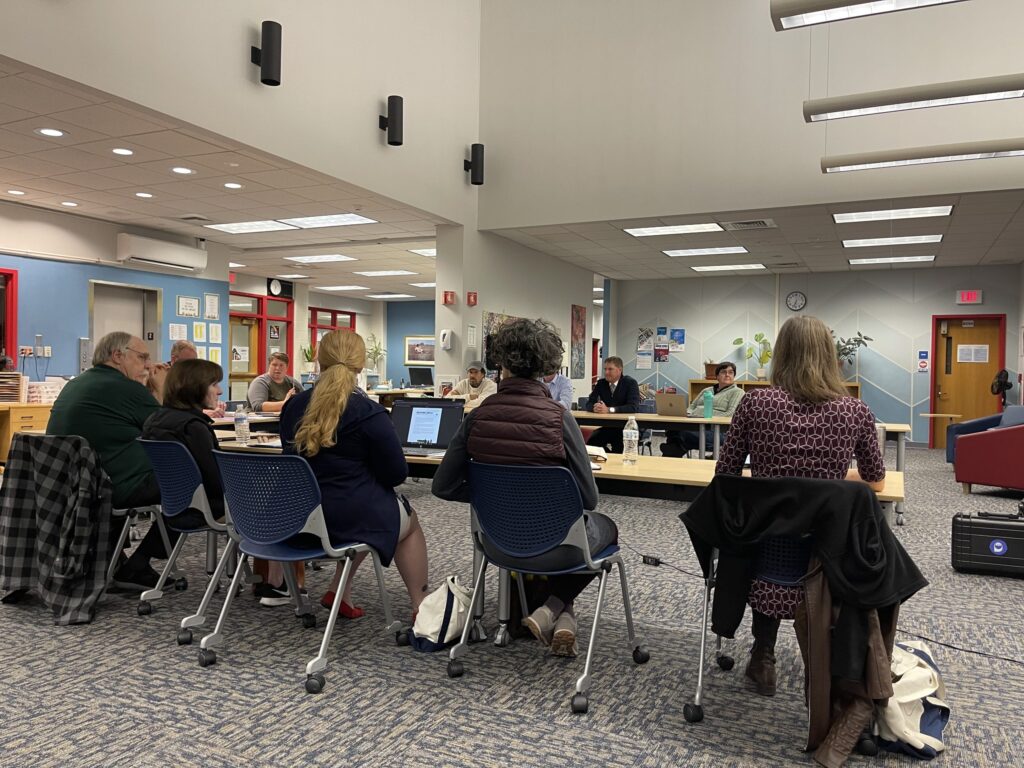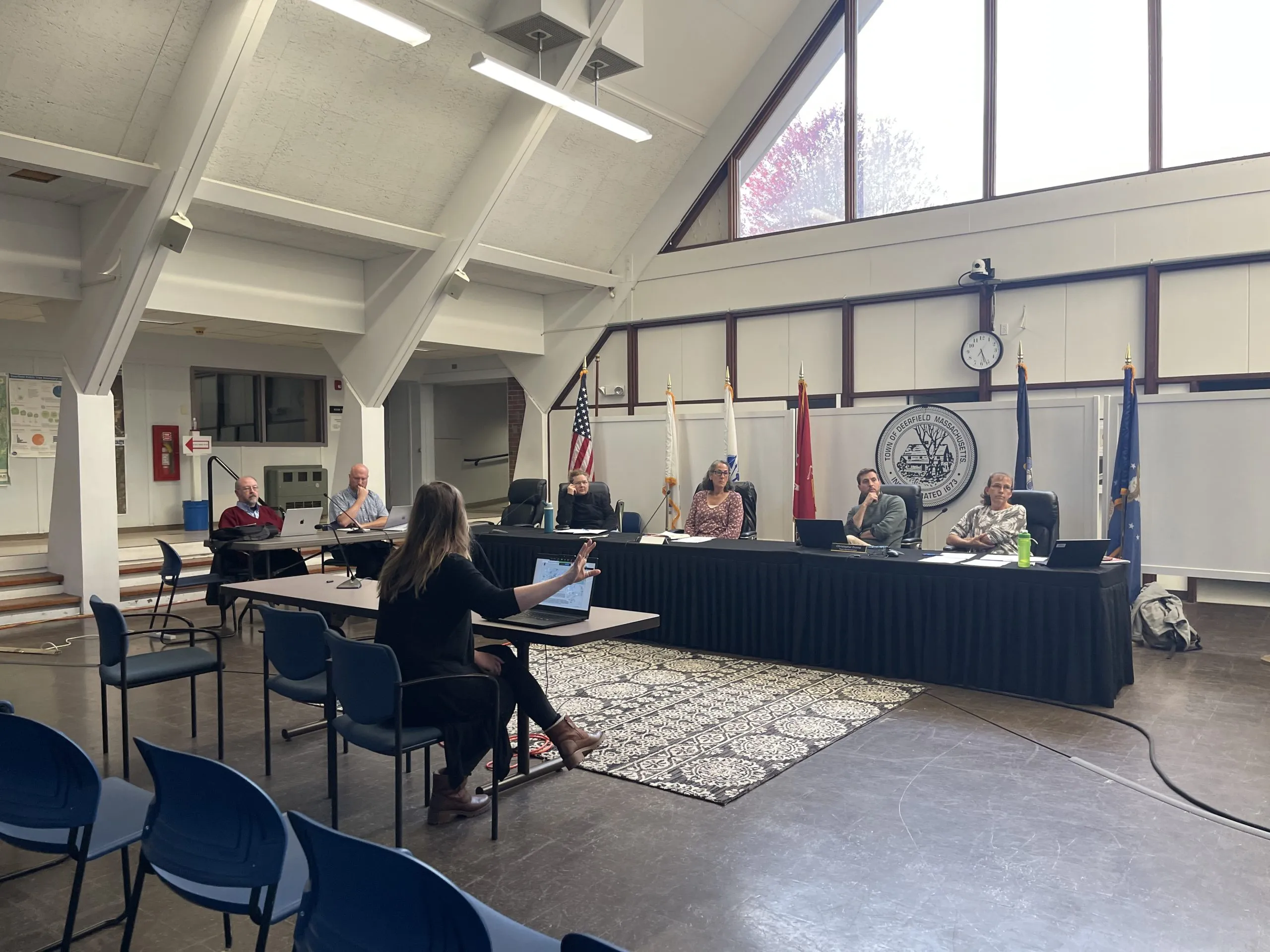Deerfield Finance Committee: DEERFIELD — The Deerfield Finance Committee has expressed concerns over potential financial impacts of climate initiatives on residents, voting not to recommend two of the three Special Town Meeting articles aimed at securing a Climate Leader Community designation for the town.
The Climate Leader Community designation builds on the Green Communities program, which encourages municipalities to reduce energy usage while supporting the state’s clean energy goals, including a commitment to net-zero greenhouse gas emissions by 2050. Towns that earn this designation become eligible for $150,000 in technical assistance through the Decarbonization Technical Support Grant and up to $1 million in state funding for climate resiliency projects via the Decarbonization Accelerator Grants.
Nearby towns are already pursuing this recognition: Ashfield became one of the state’s first Climate Leader Communities in May, while Warwick and Montague are also considering similar measures. Deerfield has gathered significant community support, with around 250 signatures submitted to secure three articles on the Oct. 29 Special Town Meeting warrant.
Articles on the Warrant
1. Specialized Energy Code for New Buildings
The first article proposes replacing the town’s Stretch Energy Code with the Specialized Energy Code, which regulates new construction to promote energy efficiency and reduced greenhouse gas emissions. The code encourages the installation of all-electric energy systems when practical.
Planning Board member Emily Gaylord emphasized that the Specialized Energy Code would help Deerfield control costs in a volatile energy market and build long-term energy independence.
However, Finance Committee members raised concerns:
- Julie Chalfant noted a discrepancy in the bylaw, which incorrectly references existing construction instead of only new construction.
- Mark Brennan cited a study highlighting the high costs of installing electric heat pumps in public buildings, estimating expenses between $5 million and $8 million.
- John Paresky warned the measure could increase housing costs for residents.
Despite the committee’s concerns, proponents clarified that the code only encourages all-electric systems when practical, mitigating cost risks.
2. Zero-Emission First Vehicle Policy
The second article, which the Finance Committee unanimously recommended, establishes a Zero-Emission First Vehicle Policy. This requires the town to purchase only zero-emission vehicles when commercially available and practicable, with exemptions for essential vehicles like police cruisers.
Committee members noted that the policy offers flexibility and practical implementation measures, making it less financially burdensome than the Specialized Energy Code.
Read about: Union Budget 2026-27: Finance Ministry Begins Preparations with Focus on Domestic Growth
3. Municipal Decarbonization Pledge
The third article involves a community commitment to municipal decarbonization, aiming for the elimination of fossil fuel usage in municipal buildings and vehicles.
While some members supported the initiative as a non-binding aspirational goal, others felt it was too vague or non-committal. With a tie vote in the Finance Committee, the recommendation did not pass, though community leaders remain optimistic about public support.
Community and Stakeholder Support
The articles have garnered backing from:
- Deerfield for Responsible Development, a community group advocating climate action
- Members of the Planning Board and Energy Conservation Committee
- Local residents committed to sustainable initiatives
The Finance Committee’s caution reflects broader concerns about regulatory compliance, potential costs, and practical implementation, especially for projects like converting the wastewater treatment plant and library to renewable energy systems.

Upcoming Information Session
To ensure residents are informed ahead of the Special Town Meeting, an information session led by Emily Gaylord will be held on Sunday, Oct. 26, 2025, at Deerfield Elementary School from 12:00 PM to 1:30 PM. Community members are encouraged to attend to learn more about the proposed climate initiatives.
Special Town Meeting Details
- Date: October 29, 2025
- Location: Deerfield Elementary School
- Articles on Climate Initiatives: 14, 15, 16
- Other Articles: 13 additional warrant articles to be considered
Despite the Finance Committee’s mixed recommendations, proponents remain confident that the town can still pursue Climate Leader Community designation and secure access to state funding and technical support for sustainability projects.
Conclusion
Deerfield’s journey toward becoming a Climate Leader Community highlights the balance between ambitious sustainability goals and practical financial considerations. While the Finance Committee has expressed caution, community support remains strong, and upcoming meetings will be critical in determining the town’s commitment to climate action.
The Special Town Meeting and associated information session provide residents with the opportunity to engage with the proposals, ask questions, and shape Deerfield’s approach to clean energy, municipal decarbonization, and long-term sustainability.
Also read: Between Illness and Hunger: The Food Crisis Affecting Patients in Ecuador
FAQs of Deerfield Finance Committee
1. What is a Climate Leader Community?
A Climate Leader Community is a designation under Massachusetts’ Green Communities program. It encourages towns to reduce energy usage and supports the state’s net-zero greenhouse gas emissions goal by 2050, offering grants and technical assistance to participating municipalities.
2. What funding is available for Climate Leader Communities?
Eligible towns can receive $150,000 in technical assistance through the Decarbonization Technical Support Grant and up to $1 million for climate resiliency projects via Decarbonization Accelerator Grants.
3. What are the three climate articles for Deerfield?
- Specialized Energy Code for new construction
- Zero-Emission First Vehicle Policy
- Municipal Decarbonization Pledge
4. Why did the Finance Committee not recommend two articles?
Concerns included potential financial impact on residents, regulatory inconsistencies, and implementation challenges, particularly for the Specialized Energy Code and the municipal decarbonization pledge.
5. When and where is the information session for these articles?
An information session will be held on Sunday, Oct. 26, 2025, at Deerfield Elementary School from 12:00 PM to 1:30 PM, led by Emily Gaylord.

xqtry3